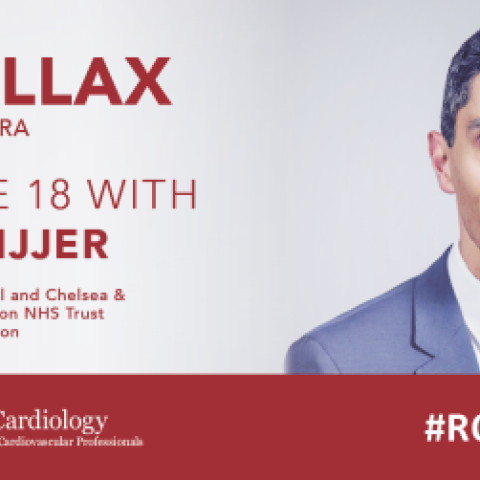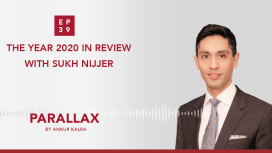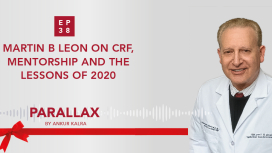
In our final episode of the year, Ankur has an long conversation with Sukh Nijjer from Imperial College London about the most impactful, exciting and controversial clinical trials of 2019. Sukh and Ankur also discuss how these trials might change practice in the future, and how practice patterns and decisions differ between the US and the UK. In light of an emerging trend of shared decision making between physicians of different specialities and patients with a vast amount of information at their fingertips, Sukh and Ankur examine what tools they use to reconcile the growing data from clinical trials.
Trials discussed in detail include those presented at the ACC in New Orleans: PARTNER 3 & Evolut Low Risk on TAVR/TAVI, and SAFARI & COAPT on radial vs femoral access; presented at the ESC in Paris: THEMIS and ISAR-REACT 5 on DAPT post-PCI, DAPA-HF on SGLT2i’s for heart failure, and COMPLETE on PCI of non-culprit lesions in STEMI; presented at TCT in San Francisco: TWILIGHT on DAPT post-PCI, and EXCEL at 5 years on PCI vs CABG in left main CAD; and finally, presented at AHA in Philadelphia: ISCHEMIA on medical vs invasive approaches in ischemic events. Submit your question to Ankur via: podcast@radciffe-group.com.
Hosted by @AnkurKalraMD. Produced by @RadcliffeCARDIO.

Her recent post on social media went viral. It was a photo of an all-women surgical team carrying out a complex structural heart procedure. It had over 100,000 views and was seen by people in over 75 different countries. It’s clear from this online reaction, that now is the time for women to be recognised for the work they are doing in medicine.
Listen to this engaging discussion between them on the challenges of being a woman in cardiovascular medicine today.
Submit your question to Ankur via: podcast@radciffe-group.com. Hosted by @AnkurKalraMD. Produced by @RadcliffeCARDIO.


In this week’s episode Ankur’s guest is Dr Mandeep R Mehra, Medical Director of Brigham Heart and Vascular Center and Professor of Medicine at Harvard Medical School.

Which COVID19 patients require risk stratification with a stress test? What are the take-home messages for physicians taking care of patients diagnosed with COVID19? What were the key trials of 2020? What can we learn from the negative results of the STRENGHT study? How have studies like STOP-AF influenced clinical practice?

What makes Dr Martin B Leon tick? What is his message to cardiologists and/or researchers at the beginning of their careers? How did the pandemic and his work as a clinician in New York change his perspective?

In this episode Ankur asks Lindsay about her treatment path. Lindsay recalls her own journey to taking control of her condition and the important role of information in patient adherence. Lindsay, former Miss Ohio, talks how she used the pageant to create awareness. Lindsay talks about work in state legislation and her plans for 2021.

US Cardiology Review journal, has recently seen a 7-fold increase in female editorial board members in response to journal-based strategic initiatives and the stellar work of USC editorial board leadership, Ankur Kalra (Editor in Chief) and Bill Gogas (Deputy Editor in Chief), who were keen to drive this change. With thanks to Dr Anastasia Mihailidou’s tenure as a new board member and her suggested nominees, ten new female board members have recently joined US Cardiology Review’s editorial board.

In this episode, Mike opens up about his childhood in Stilwell, Oklahoma. Ankur and Mike discuss how the inductive quality of art can complement the deductive principles of science. Mike recalls earlier stages of his career and warns about the blinding effect of the ego-driven, competitive culture of cardiology. Ankur asks Mike about fatherhood and about his role as an educator.
What does it mean to be fearless as a medical professional? How can you protect yourself from the emotional toll of the profession? What is Mike’s advice to early career cardiologists?
Sponsored by Edwards.

During her interventional cardiology fellowship, Dr Baron became fascinated by the implementation of novel technologies. She earned her degree in Clinical Epidemiology and spent a year working at the FDA’s Device Evaluation unit.
In 2019 Dr Baron presented the results of her late-breaking trial, COAPT. Ankur invites Suzanne to discuss the economic analysis of the study and to give a short introduction to cost-effectiveness analysis. Suzanne provides an overview of the trial and they talk about the importance of understanding the value and benefits of new devices from both the patient and the health-economic point of viewpoint.

How should you start building a research programme? What are Chuck Simonton’s thoughts on the relationship between doctors and the industry? What is Chuck’s message to young cardiologists?

In this episode Ankur asks Lindsay about her treatment path. Lindsay recalls her own journey to taking control of her condition and the important role of information in patient adherence. Lindsay, former Miss Ohio, talks how she used the pageant to create awareness. Lindsay talks about work in state legislation and her plans for 2021.

US Cardiology Review journal, has recently seen a 7-fold increase in female editorial board members in response to journal-based strategic initiatives and the stellar work of USC editorial board leadership, Ankur Kalra (Editor in Chief) and Bill Gogas (Deputy Editor in Chief), who were keen to drive this change. With thanks to Dr Anastasia Mihailidou’s tenure as a new board member and her suggested nominees, ten new female board members have recently joined US Cardiology Review’s editorial board.

In this episode, Mike opens up about his childhood in Stilwell, Oklahoma. Ankur and Mike discuss how the inductive quality of art can complement the deductive principles of science. Mike recalls earlier stages of his career and warns about the blinding effect of the ego-driven, competitive culture of cardiology. Ankur asks Mike about fatherhood and about his role as an educator.
What does it mean to be fearless as a medical professional? How can you protect yourself from the emotional toll of the profession? What is Mike’s advice to early career cardiologists?
Sponsored by Edwards.

During her interventional cardiology fellowship, Dr Baron became fascinated by the implementation of novel technologies. She earned her degree in Clinical Epidemiology and spent a year working at the FDA’s Device Evaluation unit.
In 2019 Dr Baron presented the results of her late-breaking trial, COAPT. Ankur invites Suzanne to discuss the economic analysis of the study and to give a short introduction to cost-effectiveness analysis. Suzanne provides an overview of the trial and they talk about the importance of understanding the value and benefits of new devices from both the patient and the health-economic point of viewpoint.

How should you start building a research programme? What are Chuck Simonton’s thoughts on the relationship between doctors and the industry? What is Chuck’s message to young cardiologists?






